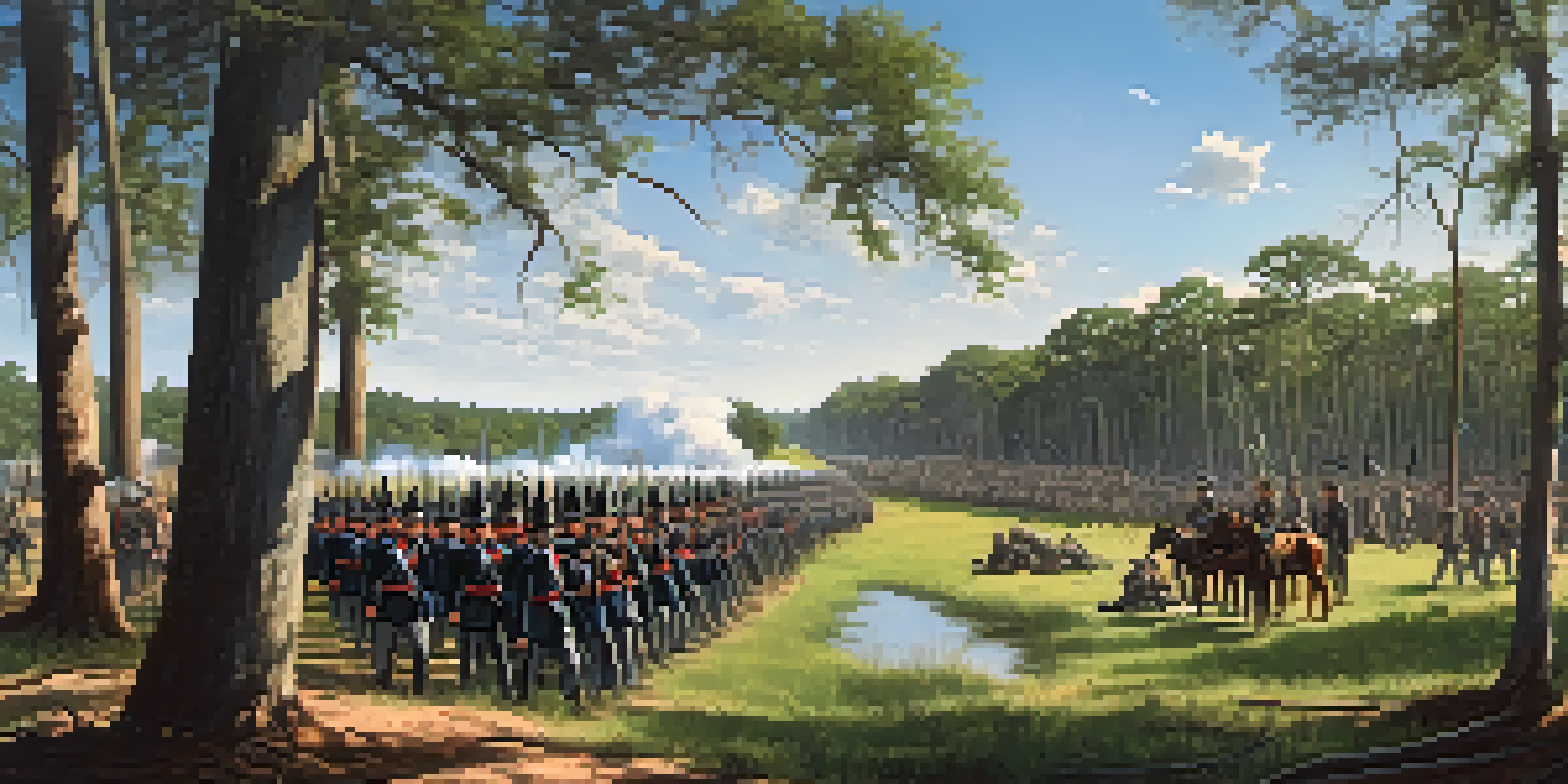Florida's Role in the American Civil War: A Historical Analysis

Introduction to Florida's Civil War Involvement
Florida's role in the American Civil War is often overshadowed by the larger battles fought in states like Virginia and Pennsylvania. However, this southern state played a crucial part in the conflict, both strategically and economically. Understanding Florida's involvement helps paint a broader picture of the Civil War's impact across the United States.
Florida's role in the Civil War reminds us that every state, regardless of its size or number of battles fought, played a part in shaping the nation’s history.
At the onset of the war, Florida was one of the first states to secede from the Union, joining the Confederacy in January 1861. This decision was driven by its agricultural economy, which relied heavily on cotton and slave labor. Its secession marked a significant commitment to the Confederate cause, showcasing the state's alignment with southern interests.
Throughout the war, Florida provided essential resources, including troops and supplies. While it may not have been a battlefield state, its contributions were vital to the Confederate war effort, making it an important player in the larger narrative of the Civil War.
Florida's Strategic Importance in the War
Florida's geographical position made it a strategic asset for the Confederacy. Its long coastline was crucial for the transportation of goods and troops, while its ports, such as Pensacola, served as key military bases. This coastal advantage allowed the Confederacy to maintain supply lines and conduct naval operations.

Moreover, Florida's interior swamps and forests provided a natural barrier against Union advances. These challenging terrains made it difficult for Union forces to penetrate deep into the state. As a result, Florida became a refuge for Confederate troops, who could regroup and strategize in the state's more remote areas.
Florida's Strategic Role in the War
Florida's geographical advantages, including its long coastline and challenging interior terrain, made it a vital asset for the Confederacy during the Civil War.
The state's involvement in the conflict was not limited to military strategy; it also played a role in the larger political landscape. Florida's support for the Confederacy helped to strengthen southern solidarity and maintain the flow of resources to the Confederate cause.
Economic Contributions of Florida During the War
Economically, Florida was vital to the Confederacy due to its production of vital crops, particularly cotton and beef. These commodities were essential for trade and sustenance, providing the Confederacy with much-needed resources. Florida's agricultural output helped sustain both soldiers and civilians during the war.
The Civil War was not just a northern versus southern conflict; it was a national struggle that affected countless lives across the country.
Additionally, the state's timber resources became increasingly important as the war progressed. Timber was crucial for building fortifications, ships, and other military necessities. Florida's abundant forests provided the raw materials needed to support the Confederate war machine.
Trade routes established during the war allowed Florida to exchange its goods for other necessary supplies. This barter system helped the state maintain its economy and support the Confederate efforts, highlighting its significance beyond just military contributions.
Battles and Campaigns in Florida
While Florida may not have been the site of major battles, several key skirmishes occurred within its borders. Notable conflicts include the Battle of Santa Rosa Island and the Battle of Olustee, which were significant for their strategic implications. These battles highlighted Florida's role in the broader conflict and showcased the bravery of local troops.
The Battle of Olustee, fought in February 1864, was one of the largest engagements in Florida during the war. This battle saw Confederate forces successfully repel Union troops, securing Florida's position within the Confederacy. The outcome reinforced southern morale and demonstrated Florida's willingness to defend its territory.
Economic Contributions of Florida
The state's agricultural output, particularly in cotton and beef, along with its timber resources, supported the Confederate war effort significantly.
Although the war brought destruction and hardship, these battles also fostered a sense of unity among Floridians. Communities rallied to support their troops, showcasing the resilience and determination of the state's residents.
The Role of African Americans in Florida's Civil War
African Americans played a significant role in Florida during the Civil War, both as enslaved individuals and as free men. The war's progression led many enslaved people to seek freedom by escaping to Union lines, where they could fight for their liberation. This shift contributed to the changing dynamics of the war and the eventual push for emancipation.
In addition to escaping, many African Americans joined the Union Army, forming regiments that fought against the Confederacy. These soldiers demonstrated their commitment to freedom and equality, often facing considerable challenges on and off the battlefield. Their participation was crucial in shaping the outcome of the war and the future of civil rights in America.
The experiences of African Americans during this period highlight a complex narrative of struggle and resilience. Their contributions, both in combat and in support roles, underscored the importance of diversity in the fight for freedom and equality.
Post-War Impact on Florida's Society
The conclusion of the Civil War brought profound changes to Florida's social and economic landscape. Reconstruction efforts aimed to rebuild the state while addressing the needs of newly freed African Americans. This period was marked by significant challenges, as tensions between different groups often led to conflict.
Sharecropping emerged as a common practice in Florida, allowing many freedmen to work the land while still facing economic hardships. This system often kept them in a cycle of poverty, as they struggled to make a living from the land they worked. The legacy of this economic structure would have lasting effects on Florida's society.
Impact on African Americans
African Americans in Florida played crucial roles in the Civil War, seeking freedom and fighting in the Union Army, thereby shaping the future of civil rights in America.
In the years following the war, Florida's identity continued to evolve. The struggle for civil rights and equality persisted, shaping the state's cultural and political landscape for generations to come. Florida's Civil War experience laid the groundwork for future movements and changes in the American South.
Conclusion: Florida's Legacy in the Civil War
Florida's role in the American Civil War is a testament to the state's complex history and its contributions to the larger conflict. From its strategic importance to its economic resources, Florida played a crucial part in supporting the Confederate cause. Understanding this legacy helps us appreciate the multifaceted nature of the Civil War.
The stories of Florida's soldiers, civilians, and African Americans reflect a diverse tapestry of experiences during this tumultuous time. Their narratives remind us that the Civil War was not just a northern versus southern conflict; it was a national struggle that affected countless lives across the country.

As we reflect on Florida's place in Civil War history, we recognize the importance of remembering all facets of this conflict. By acknowledging the state's contributions and challenges, we gain a deeper understanding of how the Civil War shaped not only Florida but the entire nation.